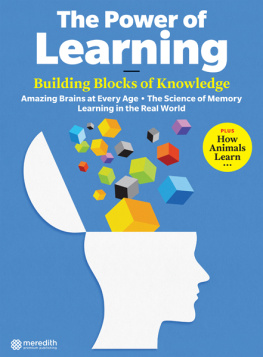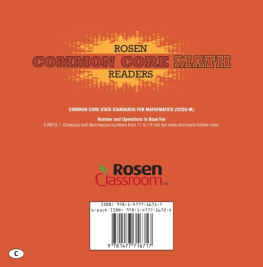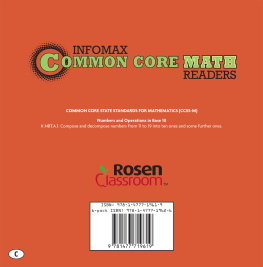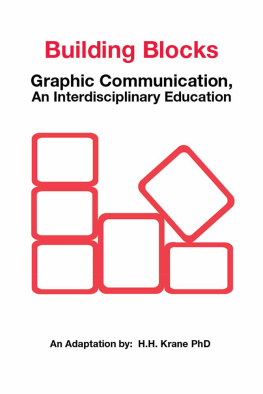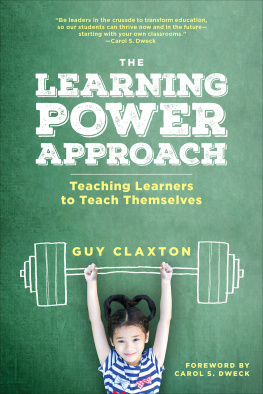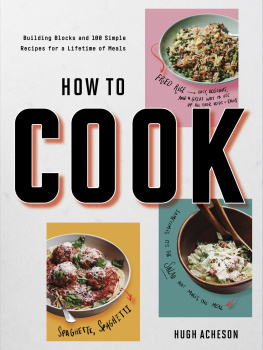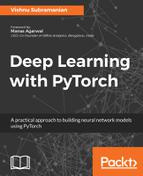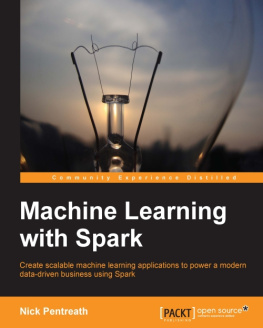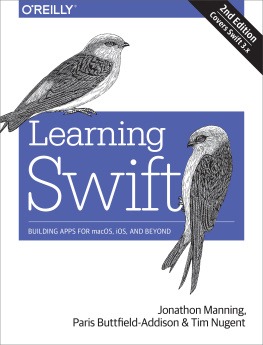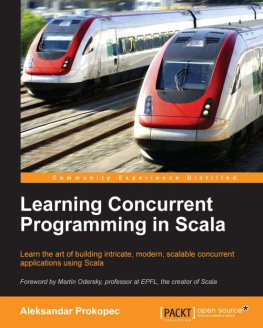The Power of Learning Building Blocks of Knowledge.
Here you can read online The Power of Learning Building Blocks of Knowledge. full text of the book (entire story) in english for free. Download pdf and epub, get meaning, cover and reviews about this ebook. City: New York, NY, year: 2021, publisher: Meredith Corporation, genre: Romance novel. Description of the work, (preface) as well as reviews are available. Best literature library LitArk.com created for fans of good reading and offers a wide selection of genres:
Romance novel
Science fiction
Adventure
Detective
Science
History
Home and family
Prose
Art
Politics
Computer
Non-fiction
Religion
Business
Children
Humor
Choose a favorite category and find really read worthwhile books. Enjoy immersion in the world of imagination, feel the emotions of the characters or learn something new for yourself, make an fascinating discovery.
- Book:The Power of Learning Building Blocks of Knowledge.
- Author:
- Publisher:Meredith Corporation
- Genre:
- Year:2021
- City:New York, NY
- Rating:3 / 5
- Favourites:Add to favourites
- Your mark:
- 60
- 1
- 2
- 3
- 4
- 5
The Power of Learning Building Blocks of Knowledge.: summary, description and annotation
We offer to read an annotation, description, summary or preface (depends on what the author of the book "The Power of Learning Building Blocks of Knowledge." wrote himself). If you haven't found the necessary information about the book — write in the comments, we will try to find it.
Unknown: author's other books
Who wrote The Power of Learning Building Blocks of Knowledge.? Find out the surname, the name of the author of the book and a list of all author's works by series.
The Power of Learning Building Blocks of Knowledge. — read online for free the complete book (whole text) full work
Below is the text of the book, divided by pages. System saving the place of the last page read, allows you to conveniently read the book "The Power of Learning Building Blocks of Knowledge." online for free, without having to search again every time where you left off. Put a bookmark, and you can go to the page where you finished reading at any time.
Font size:
Interval:
Bookmark:

The Power of Learning
Building Blocks of Knowledge
Amazing Brains at Every Age The Science of Memory Learning in the Real World

LEARNED WORDS
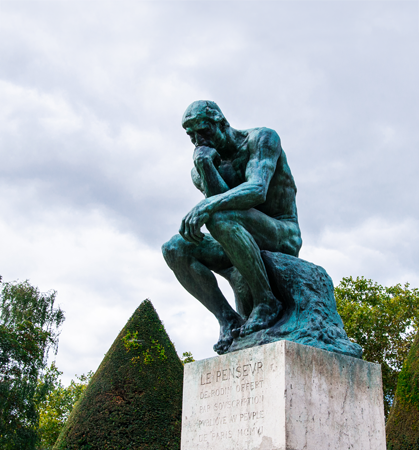
I cannot teach anybody anything, I can only make them think.
SOCRATES
Try to learn something about everything and everything about something.
THOMAS H. HUXLEY
Education is not the filling of a pot, but the lighting of a fire.
W.B. YEATS
The whole of life, from the moment you are born to the moment you die, is a process of learning.
JIDDU KRISHNAMURTI
We cannot solve our problems with the same thinking we used when we created them.
ALBERT EINSTEIN
That is what learning is. You suddenly understand something youve understood all your life, but in a new way.
DORIS LESSING
Education is the passport to the future, for tomorrow belongs to those who prepare for it today.
MALCOLM X
Learning is not attained by chance. It must be sought for with ardor and attended with diligence.
ABIGAIL ADAMS
Never let formal education get in the way of your learning.
MARK TWAIN
Anyone who stops learning is old, whether at 20 or 80. Anyone who keeps learning is young.
HENRY FORD
I am still learning.
MICHELANGELO AT 87
Live as if you were to die tomorrow. Learn as if you were to live forever.
MAHATMA GANDHI
I am always ready to learn although I do not always like being taught.
WINSTON CHURCHILL
The beautiful thing about learning is nobody can take it away from you.
B.B. KING
Education is the ability to listen to almost anything without losing your temper or your self-confidence.
ROBERT FROST
INTRODUCTION
ALL WE DO IS LEARN
By observation, by practice, by conscious studying and by subconscious imitation, human beings are multifaceted learning machines from our first days to our last
BY RICHARD JEROME

YOU MAY NOT realize it, but youve got something wonderful in common with the nine-spined stickleback. That would be a species of freshwater fish, scarcely more than two inches long, named for a row of spiky protrusions from its backboness. Apart from that distinguishing characteristic, the stickleback might at first blush seem inconsequential. But theres more to it than meets the eyehidden depths, so to speak. A 2009 study, published in the journal Behavioral Ecology , revealed that this diminutive creature displays an uncannyindeed downright humanability to learn. The fish scrutinizes the feeding behavior of its fellow sticklebacks, discerns which ones are the best foragers and mimics them in order to improve its own feeding success. Other species are known to engage in this social learning, as its known, typically when young animals imitate adults in their group. But the sticklebacks in the study showed a stunningly sophisticated knack for applying observed knowledge to their advantage, a strategy thought unique to Homo sapiens . Nine-spined sticklebacks may be the geniuses of the fish world, study co-author Kevin Laland, an evolutionary biologist at St. Andrews University, in Scotland, has said. Its remarkable that a form of learning found to be optimal in humans is exactly what these fish do.
Within limits, of course. Thanks to that ineffably complex neurological supercomputer housed in our skulls, humans are still the only species that can learn to, say, sequence genes, bake ziti, write Ulysses or (perhaps) parallel park. Whether intentionally, by accident, through osmosis or otherwise, we hoover up data, ideas, behaviors, and all manner of stimuli from day one through day last. We learn at wildly varying rates and levelsbut whatever our personal intellectual capacity, we never really stop taking in information, however complicated or quotidian. We learn consciously and by designthrough education or study and we learn when were not even aware were learning.
Deconstruct your daily existenceall that you do, see, hear, feel and experience, your cache of general knowledge. You learned to walk, talk and know right from left. You learned that if you stick your hand into a flame it burnsand you catalogued that sensation for future reference. You learned how to recognize people and distinguish them (when appropriate) from barnyard animals. You learned that dark clouds can bring rain, and you learned that if you run with scissors you could put your eye out. Sometimes you were taught by elders; other times, like a nine-spined stickleback, you learned through observation. Or, perhaps, you learned by just doing it.
LEARNING IS LAYERING. We collect and accumulate information like the rings of an ancient tree. As small children we learn countless elementary skills and lessons, and we learn them so completely that today we cant remember not knowing them. Before I entered kindergarten, my mother taught me to read, an experience so vivid I can still see it, all these decades later. Wed snuggle up on her bed, my cheek pressed against her faintly freckled arm, one of those Grosset & Dunlap childrens books open on the spread, light streaming in through the dormer window, a soft breeze rustling the eyelet curtains. Indeed, I remember almost every detail about learning to readexcept actually learning to read. But I did learn, as most of us do, so that one day, by some strange alchemy, I could glance at the phrase by some strange alchemy and recognize not only each word and its meaning, but also the entire sequence and its contextthat it was meant figuratively, as a kind of rhetorical flourish used for effect, and not to suggest that my mom dabbled in medieval mysticism. (Though she was kind of magical, at that.)
Over time we flesh out our rudimentary baseline knowledge with data and details. By rote, we commit to memory raw numbers and factoids to regurgitate on demand (baseball statistics, in my case). But as we grow into adolescence and adulthood, if all goes well, our learning takes on a new depth. We dont simply stockpile raw knowledge, we also enrich it with understanding. We retrieve memorized material and apply reason to solve problems or adapt to environmental changes and challenges. We learn to grasp shades of meaning, appreciate nuance, recognize subtext, differentiate between seriousness and sarcasm. We learn to read a room as well as a book, to develop emotional intelligence and empathy. All of this learning unfolds inside the brain and involves an elaborate biochemical choreography, performed by neurons, synapses and neurotransmittersa process that remains largely mysterious.
How, for example, does one account for someone such as Leslie Lemke? The blind Wisconsin pianist, who has performed all over the world, is whats known as an autistic savant. He has a low verbal IQ of 58 and suffers from cerebral palsy. Yet Lemke, now 69, can listen to a piece of music once through, and no matter how intricate the work, play it back with unerring precision; not only that, he can improvise exquisitely crafted variationsand, if the mood strikes him, make up compositions of his own on the spot. Lemke has never taken a music lesson in his life. Another unschooled savant, the sculptor Alonzo Clemons, 63, can glance at an animal for a few seconds, and mold a clay replica that is essentially exact in every detail, down to the last muscle and tendon. The late psychiatrist Darold Treffert, a specialist in autism and savant syndrome who knew both men, suggested that such savants possess genetic memory, a kind of chip in their brains that gives them not only natural skills and abilities but innate access to the vast syntax and rules of art, mathematics, music and even language, in the absence of any formal training and in the presence of major disability. For Lemke and Clemons, this chip of sophisticated knowledge comes factory installed.
Next pageFont size:
Interval:
Bookmark:
Similar books «The Power of Learning Building Blocks of Knowledge.»
Look at similar books to The Power of Learning Building Blocks of Knowledge.. We have selected literature similar in name and meaning in the hope of providing readers with more options to find new, interesting, not yet read works.
Discussion, reviews of the book The Power of Learning Building Blocks of Knowledge. and just readers' own opinions. Leave your comments, write what you think about the work, its meaning or the main characters. Specify what exactly you liked and what you didn't like, and why you think so.

